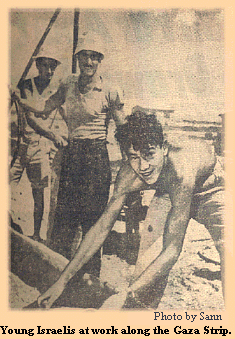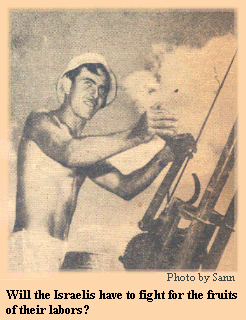|

New York Post Tuesday, October 25, 1955
 By PAUL SANN
By PAUL SANN

 In Israel today, nearly everyone takes it for granted that another war with the Arabs must be fought sometime.
In Israel today, nearly everyone takes it for granted that another war with the Arabs must be fought sometime.
It is a hard fact of life in the Jewish State, another of the many burdens a man bears there.
It doesn't matter whether you talk to a policeman wrestling with Tel Aviv's traffic or the waiter in your Jerusalem hotel, or the man plowing a field within range of Arab artillery, or the uniformed boy or girl hitching a ride to Haifa.
Or even the heads of the state.
The assumption is that sooner or later a man must fight to stay in Israel. It appears to be written that way in the annals of the time.
This was not always so--at least not in the present degree.
For the first few years after the bloodletting that attended its birth, there was a kind of restless contentment in Israel as far as the angry Arab neighbor was concerned.
There were many who thought that maybe the two worlds could live side by side after all, and indeed there was comparative quiet in this long-turbulent corner of the Middle East.
 Then, slowly, the trouble set in.
Then, slowly, the trouble set in.
More and more Palestinian Arabs, camped on the new state's doorstep since the war's end, began to slip into Israel at night, bent on mischief.
The Israelis had a mild name for these visits--"peaceful economic infiitration." And the Arabs said (and still do) that it was nothing much, just that the war refugees couldn't resist the lure of their old home grounds.
At that, all the Arabs did in the beginning was carry off such saleable items as unlaid irrigation pipes or hand tools or harvest an occasional crop from the Kibbutzim on the borders.

 But in 1951 they came in the dark on more urgent missions. They came on errands of sabotage, such as blowing up water lines, and then on missions of death.
But in 1951 they came in the dark on more urgent missions. They came on errands of sabotage, such as blowing up water lines, and then on missions of death.
Soon the peace was leaking on four of Israel's borders--Egypt, Syria, Jordan and Lebanon. Under mounting siege, the Israelis deemed the raids a matter of central inspiration and organization rather than the playful excursions of homesick refugees.
Israel elected to retaliate--not on the Biblical eye for an eye theory, but rather on the conviction that if you didn't slap the Arab invader down he would come more often and kill more often.
Soon the toll mounted on both sides. The casualties ran into the hundreds without attracting any desperate concern in the great world capitals.
But last year the gunfire in the Middle East could be heard in distant places. The Gaza Strip made the headlines with much regularity. It became a piece of real estate worth watching.
And among many in Israel, just as they were seeing the fruits of their hard labors coming up out of the long-barren and now-wonderful land, the old feeling came back--a man must fight again.
There were just as many, possibly more, who took a mild philosophical view as the border tensions mounted. They said there would be trouble with the Arabs across the way for years--10, 20, maybe more--but there didn't need to be war.
 In this school, the ranks thinned last summer as Israel went into the eighth of its years trading harder and harder blows with her neighbors. And they thinned some more on Sept. 26 when Gamal Nasser triumphantly announced his deal to swap Egyptian cotton and rice (and some cash) for arms from the Czechs.
In this school, the ranks thinned last summer as Israel went into the eighth of its years trading harder and harder blows with her neighbors. And they thinned some more on Sept. 26 when Gamal Nasser triumphantly announced his deal to swap Egyptian cotton and rice (and some cash) for arms from the Czechs.
Now Israel is on the spot.
In terms of propaganda alone, the Egyptian Premier landed a hard blow when he dipped behind the Iron Curtain for bombers, tanks, submarines and heavy artillery.
 He put his hated neighbor--"You don't know how much hatred is directed against Israel," he told me--in an exceedingly delicate two-way vise:
He put his hated neighbor--"You don't know how much hatred is directed against Israel," he told me--in an exceedingly delicate two-way vise:
I. If Israel waits while Nasser builds up his firepower, it might suddenly find itself a poor match for the other side.
II. If war comes now, no matter how, Israel stands to be accused of starting it to get its licks in before the fully advertised Arab buildup.
There is an ugly label for that sort of thing--preventive war.
Israel's leaders know how ugly it is and it is a trap they don't want to fall into. But there is a strongly vocal element in their Parliament--notably Menachem Beigin and his Herut Party--that wants preventive war and is saying so.
These utterances are sure to be turned against the Jewish State if and when there is war--again, no matter how it starts--and could lead to demands that the UN brand Israel the aggressor and come in on the other side, as it did in Korea.
While such a step by the UN would be highly unlikely in the face of the Arab record since 1947, it is clear nonetheless that Israel now more than ever needs peace.
There is only one existing peace plan--the one put forward by Secretary Dulles last Aug. 26. Dulles' formula had two main parts:
I. That Israel pay the refugees (through an international loan in which the U.S. would share) for the land they lost or take them back wherever "feasible."
II. That Israel and the Arab States sign non aggression pacts after agreeing on boundary "readjustments."
The italics are mine--because they point like neon signs to the mile-wide differences between the two sides.
 Israel says it will pay compensation but can't take any refugees back because they have been on her borders fighting her all these years and would only come in as a Fifth Column of staggering proportions.
Israel says it will pay compensation but can't take any refugees back because they have been on her borders fighting her all these years and would only come in as a Fifth Column of staggering proportions.
(Israel's population of 1,700,000 includes 180,000 Arabs now, and there are anywhere from 750,000 to 900,000 refugees camped outside.)
The Arab States, notably Egypt, the strongest, says Israel must take back all the refugees.
The boundary problem is just as tough.
Israel says it cannot cede any territory to the Arabs because its present boundaries represent what it won in 1948 in a war the loser started.
The Arab States say they can't talk peace, even if they wanted to, unless Israel agrees to shrink her borders to the narrow lines originally set by the United Nations in 1947.
 Against these two vast areas of disagreement, plus the hard Israeli-Jordan stands against the UN proposal to internationalize Jerusalem (now split in two), everything else is comparatively minor.
Against these two vast areas of disagreement, plus the hard Israeli-Jordan stands against the UN proposal to internationalize Jerusalem (now split in two), everything else is comparatively minor.
In my conversations with Prime Minister Sharett in Jerusalem and Premier Nasser in Cairo, I couldn't find an inch of leeway on either side on the main issues.
The same thing was true with the men closest to Sharett and the one man I got to in the very tight little circle around Nasser.
That's why the situation in the Middle East seemed so hopeless to me in the weeks I spent there.
It seemed even more hopeless in Egypt than Israel, by the way, but that was only after I spent an evening with Nasser. The Arabian strong-arm man is a very outspoken fellow.
____
TOMORROW: The Nasser Interview, Play-by-Play.
|
|
more...
Crime |
Culture |
Middle East |
Sports |
The Literary Scene
* * *
Home |
Birdye |
Books |
Books Online |
Dolly |
Galley-Proof |
Hamill on Sann |
Letters |
Memos |
Page One
Photographs |
Reporting |
Sann on Sann |
-30- |
Tribute |
Acknowledgements |
Links |
Copyright |
Contact
|

